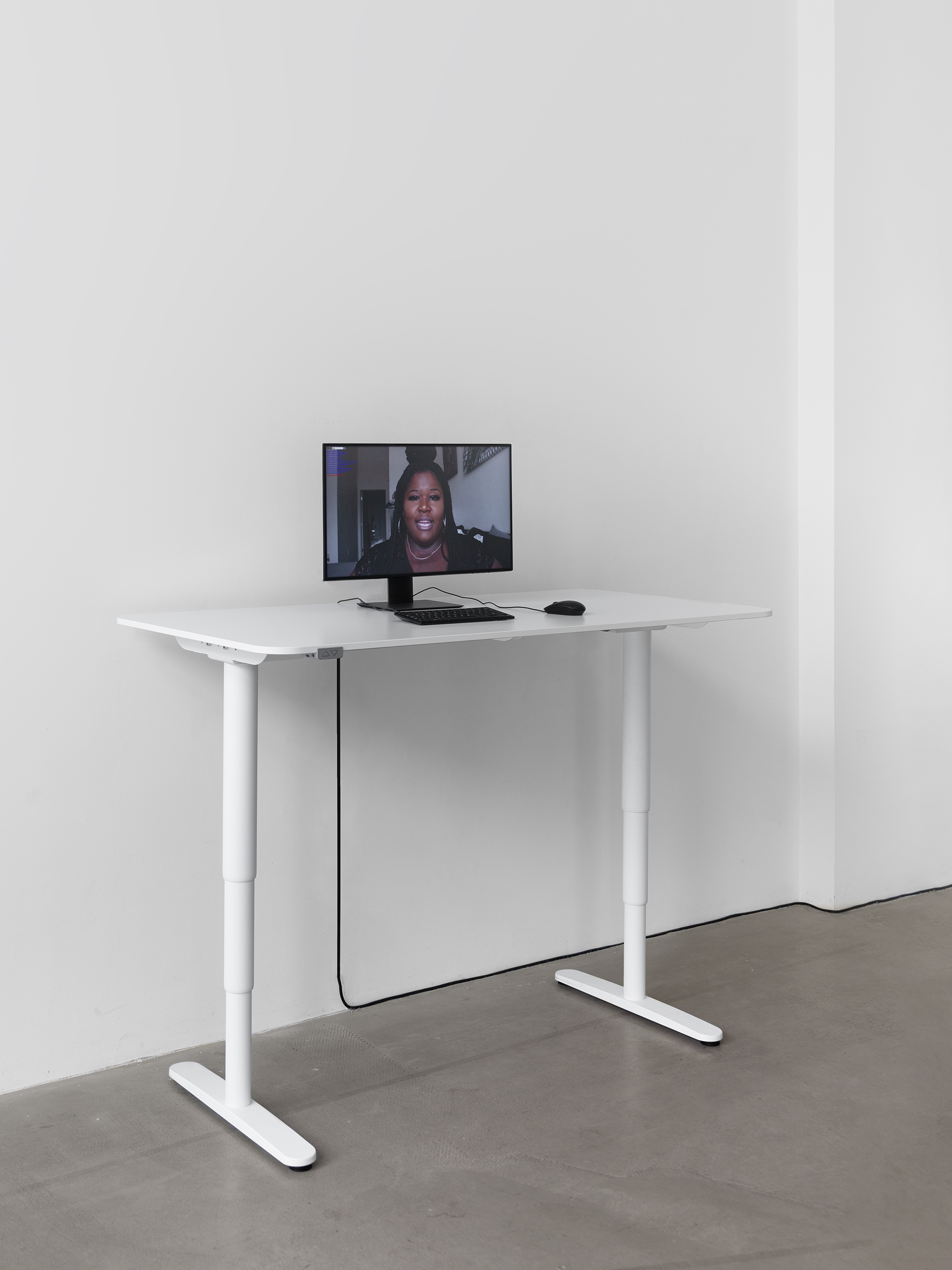

"The Stock o' Clock" displays a new stock photo every minute, 24/7, with a clock synchronised to the current time.
"DALL-IX" is a card game where players providing vague hints for an image card. All generated images are based on the same prompt, translated into different languages.
Collaborator:
Tim Kunt
"NoSearchBar" is a browser extension that removes the searchbar from the browser and every website.

"How to?" generates a continuous tutorial video stream when the
user enters an initial question.
Collaborator:
Finn Jakob Reinhardt
"Congratulations, 1000% Entrepreneurial Potential" contains the 1000 most common items + "correct awnsers" from 100 online assessments.
Born in 2000, Berlin, Germany
Education:
2023-2024: Lensbased Class, Fine Arts, Guest, University of the Arts Berlin, Berlin, Germany
2022-2023: Writing Space Design, Visual Communication, ISA, Musashino Art University Tokyo, Tokyo, Japan
2019: New Media Class, Visual Communication, B.A., University of the Arts Berlin, Berlin, Germany
2013-2019: Abitur, Alexander S. Puschkin Gymnasium Hennigsdorf, Brandenburg, Germany
Scholarship:
2023: Studienstiftung des deutschen Volkes, German Academic Scholarship Foundation, Bonn, Germany
Awards:
2024: 100 Beste Plakate 23 (selected), 100 Beste Plakate, Berlin, Germany
2023: 100 Beste Plakate 22 (selected), 100 Beste Plakate, Berlin, Germany
2022: Prix Ars Electronica (honorable mention), Ars Electronica, Linz, Austria
2022: Art Space Lab (winner), Kulturnetzwerk Neukölln e.V., Berlin, Germany
2019: Mein Bauhaus - Meine Moderne (winner), Architektenkammer Berlin, Berlin, Germany
2017: Jugend musiziert Brandenburg (winner), Jugend musiziert, Brandenburg, Germany
Grants:
2023: Art Space Lab, Kulturnetzwerk Neukölln e.V., Berlin, Germany
2021: Commission for Artistic and Scientific Projects (KKWV), University of the Arts Berlin, Berlin, Germany
Group exhibitions:
2024: Nowhere Fast, Kunstverein Culterim, Berlin, Germany
2023: Dissonance Within, Projektraum Zwitschermaschine Berlin, Berlin, Germany
2023: Rundgang, University of the Arts Berlin, Berlin, Germany
2023: Interplay (48 Stunden Neukölln), SomoS Arts, Berlin, Germany
2023: Open Campus, Musashino Art University Tokyo, Tokyo, Japan
2023: 100 Beste Plakate, Zurich University of the Arts, Zurich, Switzerland
2023: Weltformat Festival, Kornschütte City Hall Luzern, Luzern, Switzerland
2023: MAK Design Lab, Museum of Applied Arts Vienna, Vienna, Austria
2023: Doosung Gallery, Seoul, South Korea
2023: Zollverein Halle 8, Museum Folkwang Essen, Essen, Germany
2023: 100 Beste Plakate, Kulturforum Berlin State Museums, Berlin, Germany
2023: Present Im/possibilities (transmediale Vorspiel), Designtransfer, Berlin, Germany
2022: Groundless: an Endless Pursuit, SUB TEI Berlin, Berlin, Germany
2022: CyberArts Exhibition, Ars Electronica, Linz, Austria
2022: spiritus 4, Haus der Statistik, Berlin, Germany
2022: Rundgang, University of the Arts Berlin, Berlin, Germany
2022: OTHER-CONTROL vs SELF-DETERMINATION, Weizenbaum-Institut, Berlin, Germany
2022: Groundless (48 Stunden Neukölln), SUB TEI Berlin, Berlin, Germany
2022: Pause Exhibition, Atelier Cocon Coloré, Berlin, Germany
2022: CTM x transmediale Vorspiel, Moving Poets Berlin, Berlin, Germany
2021: Beyond Over It, Napoleon Komplex, Berlin, Germany
2021: Rundgang, University of the Arts Berlin, Berlin, Germany
2021: Solidarity Now, Köln International School of Design, Cologne, Germany
2020: 0km/h, ORi, Berlin, Germany
2020: Berlin Dialogues, Musikbrauerei, UFO Sound Studios, Berlin, Germany
2019: Congress of Art Pedagogy, Bauhaus-University Weimar, Weimar, Germany
2019: Deutscher Architektentag, Bundesarchitektenkammer, Berlin, Germany
2019: Europe Poster, University of Applied Sciences Aachen, Aachen, Germany
Work:
2024: Co-Founder, leihe.media, Berlin, Germany
2022: Student Assistant, Institute for Musicology and Media Studies, Humboldt University of Berlin, Berlin, Germany
2021-2024: Student Assistant, Institute of Transmedia Design, University of the Arts Berlin, Berlin, Germany
2020-2023: Working Student, Communication Design, Axel Springer SE, Berlin, Germany
2020-2021: Student Assistant, Information Design, Visual Communication, University of the Arts Berlin, Berlin, Germany
2018-2019: Internship, Open Strings Berlin GbR, Berlin, Germany.
2016: Internship, FixFoto Digital GmbH, Berlin, Germany
2015: Internship, Wochenspiegel Publishing, Potsdam, Germany
Curation:
2024: Street View (48 Stunden Neukölln), Kiezkapelle, Berlin, Germany
2022: Time to Time, LAGE EGAL, Berlin, Germany
2022: No-Win Situation Catalogue Release, CLB Berlin, Berlin, Germany
2021: No-Win Situation, Treptow-Ateliers e.V., Berlin, Germany
Lecturing:
2023: "Of Other Precarities" (Lecture), Information Design, Tama Art University Tokyo, Tokyo, Japan
2023: "Prompt Engineering – Is a Hacker a Narrator?" (Lecture), Institute of Transmedia Design, University of the Arts Berlin, Berlin, Germany
2021: "No-Win Situation Exhibition Catalog" (Seminar), Visual Communication, University of the Arts Berlin, Berlin, Germany
Writing:
Reinhardt, Erik Anton (2022) "The Entrepreneurial Knight", University of the Arts Berlin, Berlin, Germany.
Reinhardt, Erik Anton (2022) "Congratulations, 1000% Entrepreneurial Potential", University of the Arts Berlin, Berlin, Germany.
Reinhardt, Erik Anton, Tur, Maxim (2021) "No-Win Situation Exhibition Catalog", University of the Arts Berlin, Berlin, Germany.
Reinhardt, Erik Anton (2021) "Exploring the Pedagogical Usefulness of Video Games with Counterfactual History: A Case Study of 'Wolfenstein: The New Order'", University of the Arts Berlin, Berlin, Germany.
Reinhardt, Erik Anton, Teschauer, Jean-Noël (2021) "Lorem Ipsum", University of the Arts Berlin, Berlin, Germany.
Referenced:
Büchner, Hermann, Hickmann, Fons (2023) "100 Beste Plakate 22", Verlag Kettler, Dortmund, Germany.
Stocker, Gerfried, Jandl, Markus (2022) "CyberArts 2022 - Prix Ars Electronica", Hatje Cantz Publishing, Linz, Austria.
Neumann, Holger, Schaumberg, Ilka (2022) "Die Zeichen der Auguren", University of the Arts Berlin, Berlin, Germany.
Krude, Anton, Joosten, Jonathan (2022) "spiritus 4", Berlin, Germany.